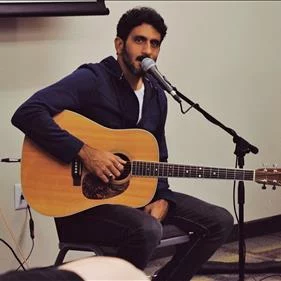‘Fauda’ star Tsahi Halevi speaks about diversity, his career with Temple Hillel students

Tsahi Halevi, who plays a lead character named Naor in the Israeli political thriller “Fauda,” spoke to more than 20 Temple University students about his life story, acceptance of diversity and his acting career.
The Dec. 3 event was hosted on campus by Owls for Israel, a pro-Israel group at Temple University Hillel.
Halevi, a native Israeli who grew up in Italy, Egypt, Belgium and Denmark, told the audience about his experience with anti-Semitism. Each place he lived in taught him a new story about the importance of acceptance, he said
He recalled an afternoon he was confronted by a woman for being Jewish. He was just a teenager living in Belgium.
“The minute I came out of the high school, there was a young lady passing by with a baby in a carriage, and she called me dirty Jew in French,” Halevi said. “Now, we have two choices. Ignore it, or understand why she calls you that. I tried to understand. I asked, ‘Do we know each other?’ And all she said was, ‘No.’”
Halevi’s willingness to embrace those around him is what led him to his current relationship with Muslim journalist, Lucy Aharish. Their four-year relationship was kept secret from many, including the media. But their October wedding made national news in Israel, and the couple was criticized for their decision to marry outside their respective faiths.
“We chose to look at the positive side and not the opposing people,” Halevi said. “We’re both open minded and having different ideas is good.”
He noted that even when their differing ideas lead to arguments, they “argue with respect.” He explained that because of all the conflict in the world, he tries to understand where others are coming from instead of creating more conflict. And he credits his parents for his ability to see the world with an open mind.
Halevi also spoke about the Israeli-Palestinian conflict, which is depicted in “Fauda.”
“If we’re neighbors, and we don’t know anything about each other, we need to communicate,” Halevi said. “Ignorance leads to fear and this fear leads to hatred and this hatred leads to other actions. I prefer before judging, or before building ideas about someone, I want to know you — really know you. I think it starts with language.”
Halevi eventually moved away from his family, returning to his native Israel to serve in the Israel Defense Forces. His fluency in multiple languages, including Hebrew, Arabic, French, Spanish and English, helped him go undercover in the army. Halevi served in the Samson Unit, an undercover special forces unit, and later in the Duvdevan Unit, an elite special operations force.
After his time in the IDF, he auditioned for Israel’s “The Voice.” Halevi, a talented singer and guitarist, was in the midst of the audition process when a friend told him about a new television series looking for actors who spoke Arabic.
He had no prior acting experience when he landed his starring role in “Fauda,” which will air its third season on Netflix in 2019.
“In ‘Fauda’ you see we’re all human beings with feelings,” Halevi said. “You see that Palestinians and Israelis have different ideas…their own political opinions and thoughts. It’s authentic.”
Halevi also captivated the audience with songs he sang in English, Hebrew and Arabic while strumming on his guitar.
Lior Berger, a Jewish Agency for Israel Fellow at Temple Hillel Israel, said she enjoyed hearing about Halevi’s marriage.
“He is very open about his life as a married man to a Muslim woman and that’s a thing you don’t usually hear from a famous person in Israel,” Berger said.
Kevin Alon, a 22-year-old marketing major, said he can relate to Halevi’s story.
“Being raised a Jewish person in America, there have definitely been times when I felt like I was being looked down on for my Judaism,” Alon said. “But hearing stories like his makes me feel hopeful.”
— Marissa Bruette